“Up to the age of thirty, or beyond it, poetry of many kinds, such as the works of Milton, Gray, Byron, Wordsworth, Coleridge, and Shelley, gave me great pleasure, and even as a schoolboy I took intense delight in Shakespeare, especially in the historical plays. I have also said that formerly pictures gave me considerable, and music very great delight. But now for many years I cannot endure to read a line of poetry: I have tried lately to read Shakespeare, and found it so intolerably dull that it nauseated me. I have also almost lost my taste for pictures or music. Music generally sets me thinking too energetically on what I have been at work on, instead of giving me pleasure. I retain some taste for fine scenery, but it does not cause me the exquisite delight which it formerly did…
“This curious and lamentable loss of the higher aesthetic tastes is all the odder, as books on history, biographies, and travels (independently of any scientific facts which they may contain), and essays on all sorts of subjects interest me as much as ever they did. My mind seems to have become a kind of machine for grinding general laws out of large collections of facts, but why this should have caused the atrophy of that part of the brain alone, on which the higher tastes depend, I cannot conceive. A man with a mind more highly organised or better constituted than mine, would not, I suppose, have thus suffered; and if I had to live my life again, I would have made a rule to read some poetry and listen to some music at least once every week; for perhaps the parts of my brain now atrophied would thus have been kept active through use. The loss of these tastes is a loss of happiness, and may possibly be injurious to the intellect, and more probably to the moral character, by enfeebling the emotional part of our nature.”
— Charles Darwin
The Autobiography of Charles Darwin, 1887
White Elephant Gifts, 2007
White Elephant
A white elephant is a supposedly valuable possession whose upkeep exceeds its usefulness, and it is therefore a liability. The term derives from the sacred white elephants kept by traditional Southeast Asian monarchs in Burma, Thailand, Laos and Cambodia. To possess a white elephant was regarded (and still is regarded, in Thailand and Burma), as a sign that the monarch was ruling with justice and the kingdom was blessed with peace and prosperity…
P.T. Barnum once sent an agent to buy a white elephant, sight unseen, hoping to use it as a circus attraction. When it arrived in Bridgeport, Connecticut, it was covered with large pinkish splotches and was not white at all. The public was not impressed and Barnum had to keep his “white elephant” hidden from public view in a stable while he tried to decide how to recover some of the high cost. The elephant later died when his stable burned down.
Source: Wikipedia
As you might guess from something like the Tiny Pineapple Nurse Book Collection, my family excels at White Elephant gift exchanges. All through the year, we hoard the obscure, the bizarre, and the grotesque, waiting for the perfect opportunity to unload the atrocities on unsuspecting friends and family members. And if our first White Elephant party of the year is any indication, this year’s haul could be one of the best/worst ever.
Here are just three examples of the glorious bounty so far…
Zippy the Pinhead Yellow Yarn Gorilla Baby
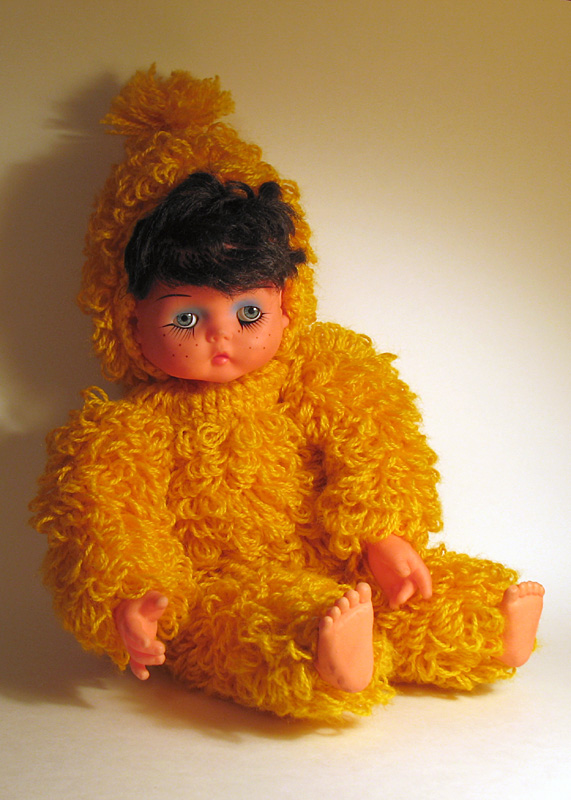
I don’t even know where to start. The blue eye shadow? The lush lower lashes? Or perhaps the fact that the yellow looped-yarn outfit isn’t an outfit at all; it’s the body of the thing? (The “hood,” which gives the whole thing a distinct Zippyesque quality, is actually stitched into the doll’s skull.)
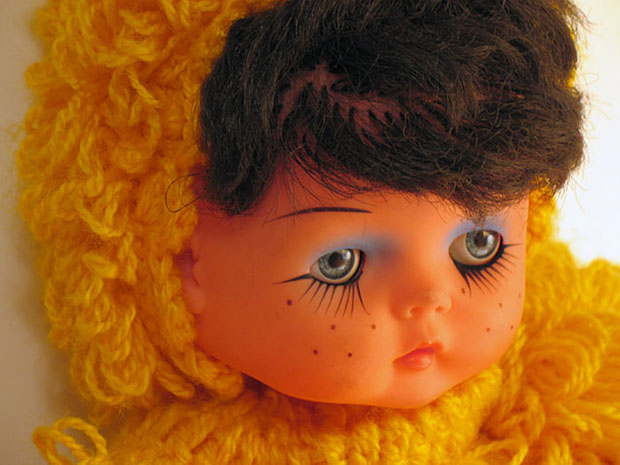
I had this cherubic spawn of craft-hell sitting in my room for a few days, but even though I’ve returned it to its rightful owner, if I wake up in the middle of the night, I can still see its ghostly specter sitting on my dresser, feeding on my soul.
Sad Clown Candle
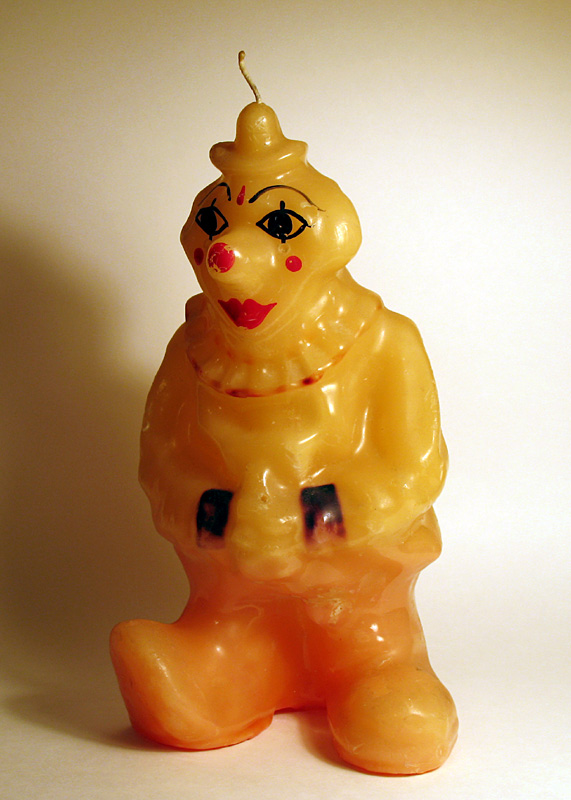
The sad clown watches,
His tender tears set in wax.
Light the wick and weep.
I’m sure this candle was a rich pearlescent white when it left the craftsman’s workbench, but the passing decades have given this waxy homage to “Le Clown Triste” the same yellowish hue as rancid tripe. Every time I even look at the thing I feel like I need to wash my hands.
Wendy can be thankful that I didn’t end up with this beauty, otherwise it would be on its way to Kauai right now.
Dalibor: playing the organ for his parents…
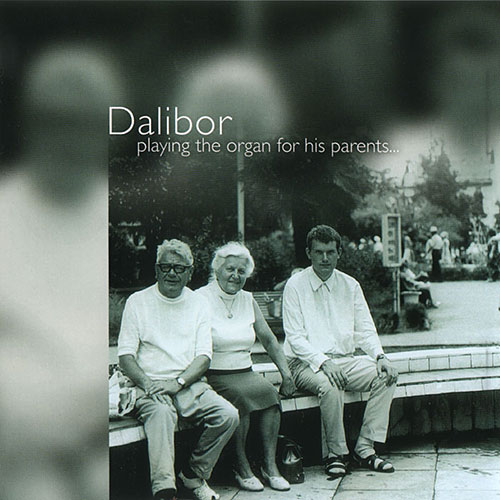
This music CD was presented to my sister-in-law, Pam, by her Czech gynecologist, Dr. Dalibor Hrádek. It features an original four-part composition recorded at St. John the Baptist Church in Glandorf, Ohio on January 21, 2001.
Unfortunately, I’ve been conditioned to associate this style of organ music with silent films, leaving me with the impression that mornings around the Hrádek breakfast table must have been like something out of Murnau’s Nosferatu.
Pam informed me that there is a companion piece: Dolibor: playing the organ for his son…
Maybe next year.
Be Honest With Yourself: Live and Learn Forever
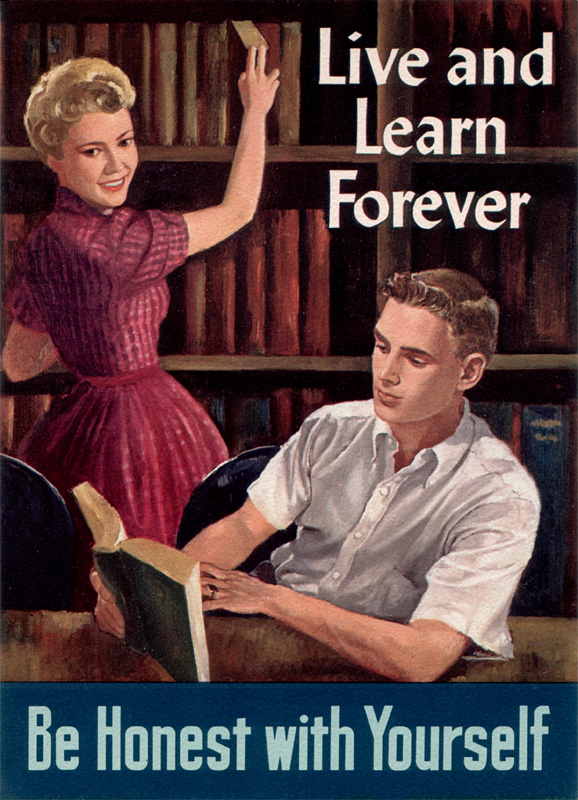
Live and Learn Forever
This life is for serving and learning; so is the next. Part of life’s lessons we learn by failing first and trying over. Some call it trial and error; another name for it is experience.
A certain amount of trial and error we must accept. It’s good for us. But there’s a short-cut to learning, shorter than trial and error, which each of us should try to find. We should seek this short-cut through thoughtful study, from the experiences of others, by the reading of good books, by going to school. Most folks call this kind of learning “education.”
The chief purpose of education is to prepare us to live happily here and hereafter…and to make the world better for others who follow. The scriptures tell us why: “We are saved no faster than we gain knowledge”; “The glory of God is intelligence.” These lofty concepts of the place of education in the lives of people are the special incentives which spur us on in our search for knowledge.
It has been said even more plainly: “…if a person gains more knowledge and intelligence in this life through his diligence and obedience than another he will have so much advantage in the world to come.”
Yes, and in this life, too. For knowledge here is also power — the power to produce the essentials of healthful, happy, comfortable living; the power to govern wisely and effectively; the power to avoid some of life’s unnecessary pains and frustrations which come to the ignorant or unadjusted; the power to recognize and appreciate truth and teach it to others.
These are some of the aims and products of learning and living–now and forever
BE HONEST WITH YOURSELF.